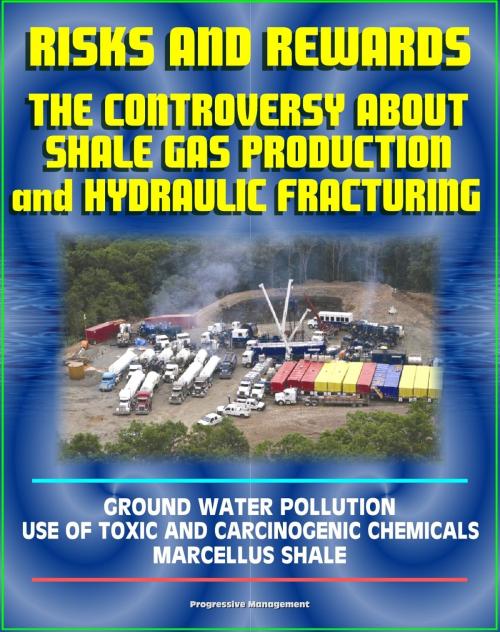Risks and Rewards: The Controversy About Shale Gas Production and Hydraulic Fracturing, Ground Water Pollution, Toxic and Carcinogenic Chemical Dangers, Marcellus Shale, Hydrofrac and Fracking
Nonfiction, Science & Nature, Science, Biological Sciences, Ecology, Social & Cultural Studies, Political Science, Government, Public Policy| Author: | Progressive Management | ISBN: | 9781458142542 |
| Publisher: | Progressive Management | Publication: | April 27, 2011 |
| Imprint: | Smashwords Edition | Language: | English |
| Author: | Progressive Management |
| ISBN: | 9781458142542 |
| Publisher: | Progressive Management |
| Publication: | April 27, 2011 |
| Imprint: | Smashwords Edition |
| Language: | English |
Gain a complete understanding of the important controversy over hydraulic fracturing for shale gas production with this outstanding six-hundred page collection of up-to-date official documents and publications on the risks and rewards of shale gas. It includes the new report from the House Committee on Energy and Commerce disclosing that that oil and gas service companies conducting hydraulic fracturing used more than 2500 fracturing products containing 750 chemicals, some of which are toxic and carcinogenic. This report lists every chemical disclosed by the industry, and reveals that some of the chemicals remain proprietary and cannot be identified. According to the report: "Hydraulic fracturing has helped to expand natural gas production in the United States, unlocking large natural gas supplies in shale and other unconventional formations across the country. As the use of hydraulic fracturing has grown, so have concerns about its environmental and public health impacts. One concern is that hydraulic fracturing fluids used to fracture rock formations contain numerous chemicals that could harm human health and the environment, especially if they enter drinking water supplies. The opposition of many oil and gas companies to public disclosure of the chemicals they use has compounded this concern."
Contents include material from the EPA, USGS, Department of Energy, U.S. Congress, the Energy Information Administration (EIA) and others. There is a complete reproduction of EPA public meeting comments from events in Texas, Colorado, Pennsylvania, and New York, offering valuable insight into the controversy. Technical documents and regulations provide unique details and understanding.
An up-to-date primer from the U.S. Department of Energy provides a comprehensive overview of shale gas production in the United States - including the use of hydraulic fracturing - and environmental protection issues, especially water resource management. Contents include: The Importance Of Shale Gas * The Role of Natural Gas in the United States’ Energy Portfolio * The Advantages of Natural Gas * Natural Gas Basics * Unconventional Gas * The Role of Shale Gas in Unconventional Gas * Looking Forward * Shale Gas Development * Geology * Sources of Natural Gas Shale Gas * Barnett Shale * Fayetteville Shale * Haynesville Shale * Marcellus Shale * Woodford Shale * Antrim Shale * New Albany Shale * Regulatory Framework * Federal Environmental Laws * State * Local Regulation * Impacts on Water Quality * Clean Water Act * Safe Drinking Water Act * Oil Pollution Act of 1990 – Spill Prevention Control and Countermeasure * Regulation of Impacts on Air Quality * Clean Air Act * Air Permits * Regulation of Impacts to Land * Resource Conservation and Recovery Act (RCRA) * Endangered Species Act * State Endangered Species Protections * Operations on Public Lands * Federal Lands * State Lands * Other Federal Laws and Requirements that Protect the Environment * Comprehensive Environmental Response, Compensation, and Liability Act * Emergency Planning and Community Right-to-Know Act * Occupational Safety and Health Act * Environmental Considerations * Horizontal Wells * Reducing Surface Disturbance * Reducing Wildlife Impacts * Reducing Community Impacts * Protecting Groundwater: Casing and Cementing Programs * Hydraulic Fracturing * Fracture Design * Fracturing Process * Fracturing Fluids and Additives * Water Availability * Water Management * Naturally Occurring Radioactive Material (NORM) * Air Quality * Sources of Air Emissions * Composition of Air Emissions * Technological Controls and Practices * Summary * Acronyms and Abbreviations * Definitions
This is a privately authored news service and educational publication of Progressive Management.
Gain a complete understanding of the important controversy over hydraulic fracturing for shale gas production with this outstanding six-hundred page collection of up-to-date official documents and publications on the risks and rewards of shale gas. It includes the new report from the House Committee on Energy and Commerce disclosing that that oil and gas service companies conducting hydraulic fracturing used more than 2500 fracturing products containing 750 chemicals, some of which are toxic and carcinogenic. This report lists every chemical disclosed by the industry, and reveals that some of the chemicals remain proprietary and cannot be identified. According to the report: "Hydraulic fracturing has helped to expand natural gas production in the United States, unlocking large natural gas supplies in shale and other unconventional formations across the country. As the use of hydraulic fracturing has grown, so have concerns about its environmental and public health impacts. One concern is that hydraulic fracturing fluids used to fracture rock formations contain numerous chemicals that could harm human health and the environment, especially if they enter drinking water supplies. The opposition of many oil and gas companies to public disclosure of the chemicals they use has compounded this concern."
Contents include material from the EPA, USGS, Department of Energy, U.S. Congress, the Energy Information Administration (EIA) and others. There is a complete reproduction of EPA public meeting comments from events in Texas, Colorado, Pennsylvania, and New York, offering valuable insight into the controversy. Technical documents and regulations provide unique details and understanding.
An up-to-date primer from the U.S. Department of Energy provides a comprehensive overview of shale gas production in the United States - including the use of hydraulic fracturing - and environmental protection issues, especially water resource management. Contents include: The Importance Of Shale Gas * The Role of Natural Gas in the United States’ Energy Portfolio * The Advantages of Natural Gas * Natural Gas Basics * Unconventional Gas * The Role of Shale Gas in Unconventional Gas * Looking Forward * Shale Gas Development * Geology * Sources of Natural Gas Shale Gas * Barnett Shale * Fayetteville Shale * Haynesville Shale * Marcellus Shale * Woodford Shale * Antrim Shale * New Albany Shale * Regulatory Framework * Federal Environmental Laws * State * Local Regulation * Impacts on Water Quality * Clean Water Act * Safe Drinking Water Act * Oil Pollution Act of 1990 – Spill Prevention Control and Countermeasure * Regulation of Impacts on Air Quality * Clean Air Act * Air Permits * Regulation of Impacts to Land * Resource Conservation and Recovery Act (RCRA) * Endangered Species Act * State Endangered Species Protections * Operations on Public Lands * Federal Lands * State Lands * Other Federal Laws and Requirements that Protect the Environment * Comprehensive Environmental Response, Compensation, and Liability Act * Emergency Planning and Community Right-to-Know Act * Occupational Safety and Health Act * Environmental Considerations * Horizontal Wells * Reducing Surface Disturbance * Reducing Wildlife Impacts * Reducing Community Impacts * Protecting Groundwater: Casing and Cementing Programs * Hydraulic Fracturing * Fracture Design * Fracturing Process * Fracturing Fluids and Additives * Water Availability * Water Management * Naturally Occurring Radioactive Material (NORM) * Air Quality * Sources of Air Emissions * Composition of Air Emissions * Technological Controls and Practices * Summary * Acronyms and Abbreviations * Definitions
This is a privately authored news service and educational publication of Progressive Management.















